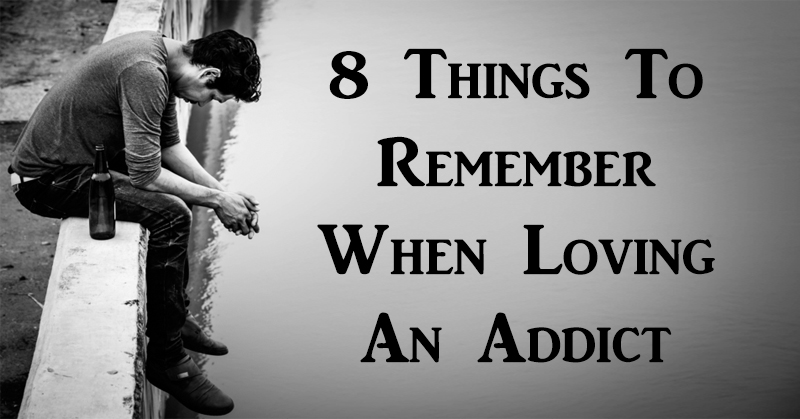Devastated. Furious. Bewildered. Betrayed. Those are just some of the words people might use to describe how it feels to watch a loved one become totally consumed by addiction. Addiction can rip families apart and destroy relationships. Family members and friends wonder how they can love someone who they barely recognize. It can be upsetting and turbulent, but the addict in your life needs you to not give up on them.
Here are 8 things to remember when loving an addict:
1. Define acceptable boundaries.
You can’t force an addict to change, but you can and should set your own boundaries. That may mean they are not allowed to be home when they are using, or you are unwilling to talk to them when they are high. Regardless of what your boundaries consist of, it is important that you do not back down from them. Do not allow the addict to sweet talk, bully, or pressure you into changing your mind.
2. Apply a “show don’t tell” approach.
As convincing as they might sound, an addict’s words are often empty. Let them know they need to prove it by doing it, not just by saying it. No matter how sweet or serious their tone is or how powerful their choice of words, stand your ground with a “show me, don’t tell me” approach.

3. Do not get sucked into arguments.
Many substance abusers become argumentative, especially once they see that you are setting boundaries. You won’t win in an argument with them and the situation will often escalate. Don’t try to fight fire with fire and don’t take their bait. If the addict blames you or says that you don’t care about them, walk away instead of arguing and trying to show that you do, indeed, care. If you think that physical violence may occur, do not hesitate to call 911.
4. Recognize that you cannot force change.
Pressure will not force the addict to give up their habits. Addicts will seek help when they are ready. Pressure from loved ones that mean well can lead to the addict isolating themselves in order to avoid feeling like they’re being nagged.
5. Put yourself and children as priority.
Never allow yourself or your children to be abused or to be exposed to harmful chemicals, toxic smells, or any shifty people who may come around. Your safety and welfare comes first. This is part of setting boundaries. Tell the addict if they insist on using, they cannot do it in the house.

6. Don’t be an enabler.
It might be difficult to refrain, but if an addict asks for money, don’t give it to them. Rather than give them cash they can use on drugs, buy them a meal or put gas in their car. Do not help them cover up their mistakes. Hold them accountable for their own actions. It hurts to see a loved one struggle, but in the long run you are causing them more harm by allowing their destructive actions to continue to cause harm to themselves and to you.
7. See them as a sick person, not a bad person.
This means holding back on shaming. The addict is already ashamed of their lack of control—the last thing they need is to be told they’re a disappointment. Just like an insane person, their addiction is making them do things they normally wouldn’t do. Try to remember who they were before they became an addict. And admit your own make mistakes, too. As easy as it may be for you to blame the addict in your life for all of your problems, there is actually more benefit in examining what you may be adding to this situation. Just be sure to only take blame for what you have done—not for what the addict has done.
8. Don’t lose hope.
The addict has no hope. They need you to believe that they can get better because they likely don’t think they can. Remember that many addicts do recover. Even if they don’t believe in themselves, believing that you believe can sometimes be enough.

Sources:
Paired Life
Candace Platter
Addiction.com


